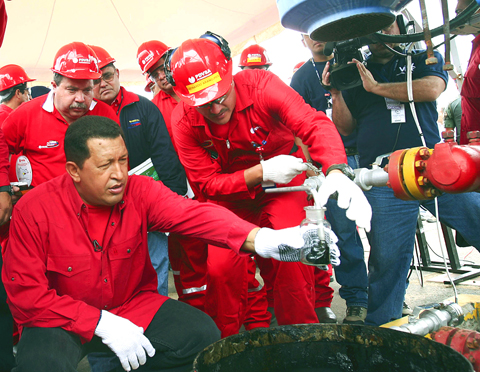Venezuelan President Hugo Chavez on Wednesday announced a US$16 billion deal with China to drill for oil in the resource-rich Orinoco basin.
“Yesterday [Tuesday], a deal was signed in Beijing for the Orinoco basin. It sets out a Chinese investment of US$16 billion over the next three years,” Chavez said at a public event.
He gave few details of the pact and did not name the Chinese companies involved, but said they would form a joint venture with state-owned Petroleos de Venezuela (PDVSA) to produce 450,000 barrels a day of extra heavy crude.

PHOTO: AFP
Venezuela, a founding member of the oil cartel OPEC and Latin America’s top oil exporter, announced on Saturday that it had signed a similar accord with a Russian consortium.
The deal will see the group of five Russian companies invest more than US$20 billion over three years, and gives them rights to drill for oil in the part of the Orinoco oil belt.
PDVSA said production with the Russian companies on the massive Junin 6 heavy crude block would begin by 2012. Junin 6 is estimated to hold 53 billion barrels of heavy crude, making it one of the world’s largest reserves.
That joint venture — with the Russian companies Rosneft, Lukoil, Gazprom, TNK-BP and Surgutneftegaz — is expected to produce 450,000 barrels a day by 2012, Chavez said.
Chavez on hailed the two deals saying the total would boost production by 900,000 barrels a day, which would be marketed along with Russian and Chinese companies.
“In addition, there will be a flood of technology into the country, with China going to build drilling platforms, oil rigs, railroads, houses,” Chavez said.
Chavez said that during his recent visit to Moscow he signed the venture that would give PDVSA a 60 percent stake in the firm, with 40 percent to the consortium.

LIMITS: While China increases military pressure on Taiwan and expands its use of cognitive warfare, it is unwilling to target tech supply chains, the report said US and Taiwan military officials have warned that the Chinese People’s Liberation Army (PLA) could implement a blockade within “a matter of hours” and need only “minimal conversion time” prior to an attack on Taiwan, a report released on Tuesday by the US Senate’s China Economic and Security Review Commission said. “While there is no indication that China is planning an imminent attack, the United States and its allies and partners can no longer assume that a Taiwan contingency is a distant possibility for which they would have ample time to prepare,” it said. The commission made the comments in its annual

DETERMINATION: Beijing’s actions toward Tokyo have drawn international attention, but would likely bolster regional coordination and defense networks, the report said Japanese Prime Minister Sanae Takaichi’s administration is likely to prioritize security reforms and deterrence in the face of recent “hybrid” threats from China, the National Security Bureau (NSB) said. The bureau made the assessment in a written report to the Legislative Yuan ahead of an oral report and questions-and-answers session at the legislature’s Foreign Affairs and National Defense Committee tomorrow. The key points of Japan’s security reforms would be to reinforce security cooperation with the US, including enhancing defense deployment in the first island chain, pushing forward the integrated command and operations of the Japan Self-Defense Forces and US Forces Japan, as

IN THE NATIONAL INTEREST: Deputy Minister of Foreign Affairs Francois Wu said the strengthening of military facilities would help to maintain security in the Taiwan Strait Japanese Minister of Defense Shinjiro Koizumi, visiting a military base close to Taiwan, said plans to deploy missiles to the post would move forward as tensions smolder between Tokyo and Beijing. “The deployment can help lower the chance of an armed attack on our country,” Koizumi told reporters on Sunday as he wrapped up his first trip to the base on the southern Japanese island of Yonaguni. “The view that it will heighten regional tensions is not accurate.” Former Japanese minister of defense Gen Nakatani in January said that Tokyo wanted to base Type 03 Chu-SAM missiles on Yonaguni, but little progress

NO CHANGES: A Japanese spokesperson said that Tokyo remains consistent and open for dialogue, while Beijing has canceled diplomatic engagements A Japanese official blasted China’s claims that Japanese Prime Minister Sanae Takaichi has altered Japan’s position on a Taiwan crisis as “entirely baseless,” calling for more dialogue to stop ties between Asia’s top economies from spiraling. China vowed to take resolute self-defense against Japan if it “dared to intervene militarily in the Taiwan Strait” in a letter delivered Friday to the UN. “I’m aware of this letter,” said Maki Kobayashi, a senior Japanese government spokeswoman. “The claim our country has altered its position is entirely baseless,” she said on the sidelines of the G20 summit in Johannesburg on Saturday. The Chinese Ministry